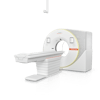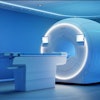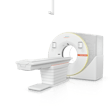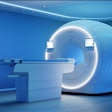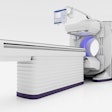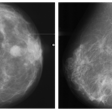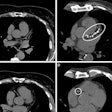CHICAGO – A new version of its 3-tesla MRI scanner, AI technologies, and CT technology improvements were among the highlights for Canon Medical Systems at RSNA 2024.
MRI
In MRI, Canon gave Vantage Galan 3T / Supreme Edition its RSNA debut. Introduced in April, the new release, for the first time, features all components that have been manufactured by Canon.
Galan 3T / Supreme Edition’s Real-time platform includes the company’s own magnet design, which delivers an expanded field of view compared with the previous magnet used in Canon MRI scanners.
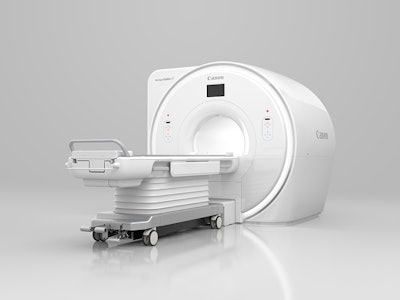 Canon's Galan 3T / Supreme Edition MRI scanner. Image courtesy of Canon Medical Systems.
Canon's Galan 3T / Supreme Edition MRI scanner. Image courtesy of Canon Medical Systems.
Canon has also incorporated its Altivity suite of AI algorithms – including its Advanced intelligent Clear-IQ Engine (AiCE) and Precise IQ Engine (PIQES -- for optimizing image quality and decreasing scanning times.
CT
Following up on last year’s launches of the Minnies-winner Aquilion One / Insight Edition and Aquilion Serve SP, Canon presented enhancements to its CT technology in Chicago. For example, its Precise IQ Engine now utilizes deep-learning reconstruction to reconstruct 1024 matrix CT images, according to the vendor.
Initially introduced with a focus on cardiac CT, its PIQE Super Resolution technology is now available for body and lung applications as well (pending U.S. Food and Drug Administration 510(k) clearance).
In addition, the company discussed expansion of its SilverBeam x-ray beam shaping energy filter. SilverBeam was first developed to support lung cancer screening, but Canon is now bringing the technology to other applications such as musculoskeletal imaging. Use of SilverBeam for trauma cervical spine scans is currently pending 510(k) clearance.
Speaking of lung cancer screening, Canon also announced “Screen for Life. Breathe with Hope,” a global initiative designed to advance lung cancer screening efforts. The initiative will include webinars and educational events to share best practices and address universal challenges for lung cancer screening, according to Canon.
In photon-counting CT developments, Canon has formed a research collaboration with Penn Medicine. The vendor recently installed its fourth photon-counting CT system at the Hospital of the University of Pennsylvania. Canon said the partnership will focus on enhancing chest/cardiac and musculoskeletal imaging.
In addition, Canon has expanded its Vina Analytics suite of AI workflow automation tools for CT. Designed to improve operational efficiency and reduce manual tasks, the new integrated tools add remote scan support, protocol management, and automated processing of neuro and chest CT exams, according to the vendor. Thanks to its web-based architecture, Vina Analytics supports protocol review, approval, and distribution, while also tracking revision histories. It also provides analytics for evaluating dose and utilization data.
AI/Informatics
Once again, Canon showcased its Instinx AI-assisted user experience, which automates scanner workflows, patient positioning, and scanning. It also highlighted its Remote Assist service, which provides real-time, remote access to Canon’s CT, molecular imaging, and MR consoles. As a result, clinicians can support protocol changes, help in training, and perform scan assistance from virtually anywhere, according to the vendor.
The company’s 360° Connect Customer Portal tool facilitates protocol adjustments, review, and session tracking. It also limits remote access to scanning operations to preserve patient safety, according to Canon.
Meanwhile, Canon also pointed to its Vitrea Advanced Visualization multimodality, vendor-neutral software applications for 2D, 3D, and 4D visualization and analysis. In addition, the firm once again emphasized its Automation Platform, which provides customers with access to AI-based clinical applications such as its Stroke CT, Chest Pain CT, and Stroke MR packages.
With Automation Platform, critical cases are flagged via Canon’s Secure Analytics Server. After clinicians are informed of these urgent situations, Canon’s Mobile DICOM Viewer offers remote access to images and results. What’s more, the company’s Mobile App can facilitate access to images and insights from various clinical applications in one place, Canon said.
